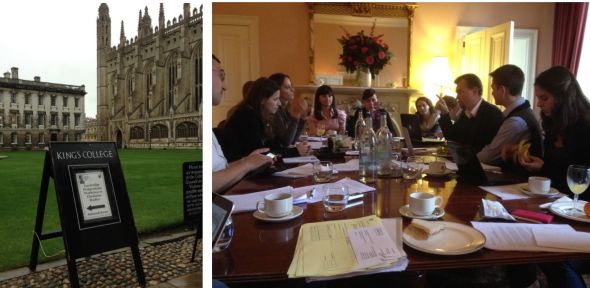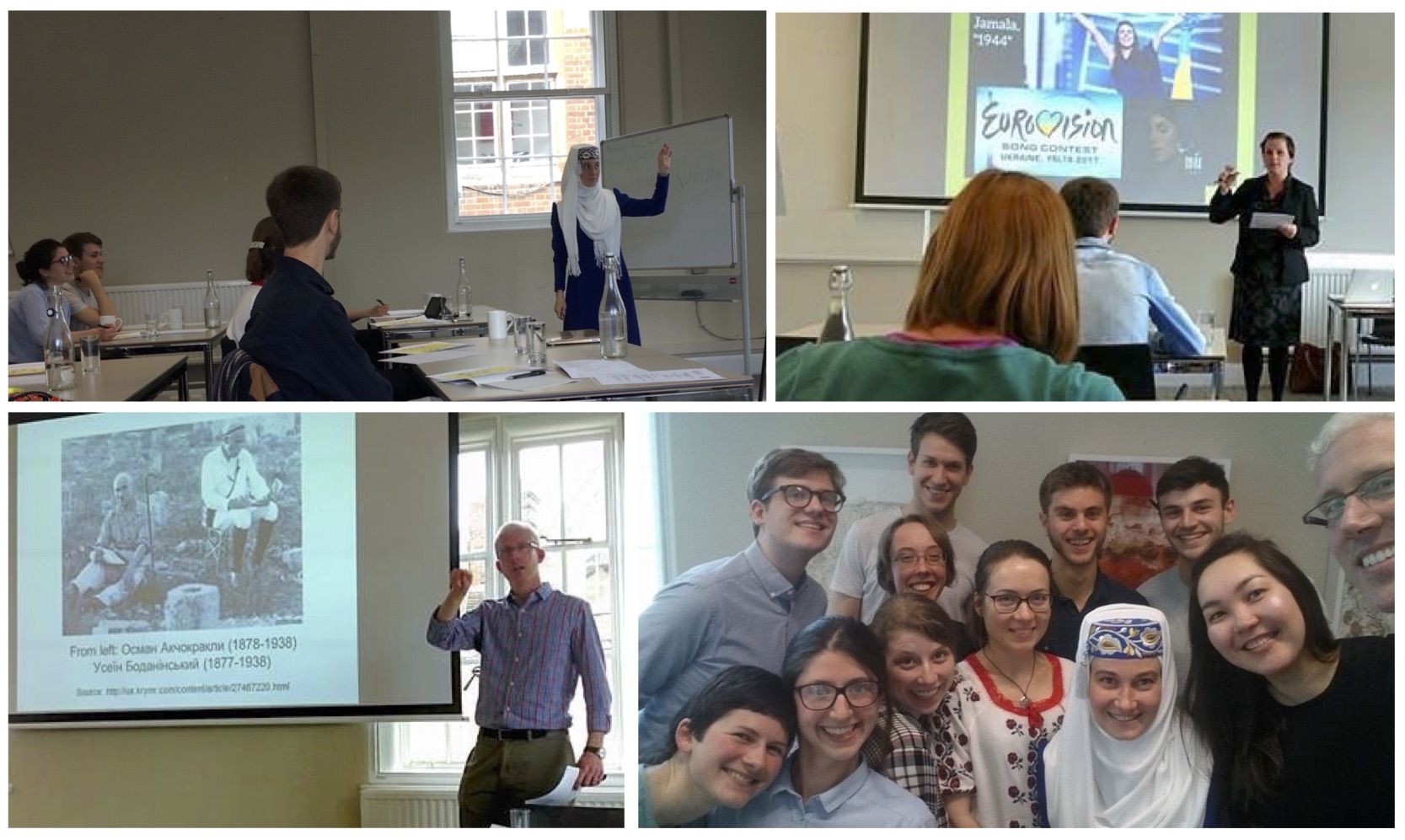
Cambridge Ukrainian Studies hosts a regular series of one-day workshops in the fields of Ukrainian history, culture and society. Led by preeminent scholars from around the world, these special events are open to qualified postgraduate students and reseachers at the beginning of their careers throughout Great Britain by application only. They are held on the grounds of King's College, Cambridge.
Preparatory reading is assigned prior to the event. For accepted workshop participants, coffee and lunch are provided, and expenses for domestic economy train travel to and from Cambridge are reimbursed.
Past workshops
Thursday and Friday, 19-20 May 2016
Cambridge Postgraduate Workshop in Crimean Tatar Language and Culture

A first for Europe: a two-day event offering Crimean Tatar language lessons and lectures in Crimean Tatar literature, music and culture.
‘The living language and culture of the Crimean Tatar people are too often neglected in geopolitical debates and in academic discourse, even in the fields of Ukrainian and Black Sea Studies’, said Dr Rory Finnin, Director of the Cambridge Ukrainian Studies programme and Head of the Department of Slavonic Studies, who has studied the Crimean Tatars for over a decade. ‘We need to understand Crimean Tatar society on its own terms, and now more than ever.’
____________________
Friday, 12 February 2016
Investigating the Historiographical Myth of Khazar Domination of the Rus’ / Oleksiy Tolochko
Led by Dr. Oleksiy Tolochko (Director of the Center for Kyivan Rus’ Studies at the Institute of Ukrainian History, National Academy of Sciences of Ukraine), this workshop explored the fundamental premise of medieval Slavonic Studies that the Kyivan polity emerged and initially developed in competition and in confrontation with the Khazar Khanate. Only one source supports this thesis: the Primary Chronicle. No other source documents any significant contact between the Rus’ of Kyiv and the Khazars. Using contemporaneous sources, the workshop considered the nature of the Rus’-Khazar relationship and the root of the historiographical myth of Khazar domination of the Rus’ put forth in the Primary Chronicle.
Selected readings:
De administrando imperio. English translation by R.J.H. Jenkins (Washington, D.C.: Dumbarton Oaks Center for Byzantine Studies, 1967), pp. 49-67.
Thomas Noonan, "The Khazar Qaghanate and its Impact on the Early Rus' State: The translatio imperii from Itil to Kiev," In: Nomads in the Sedentary World, eds. Anatoly Khazanov and André Wink (Richmond, England, 2001), pp. 76-102.
Vladimir Petrukhin, "Khazaria and Rus': An Examination of their Historical Relations," In: The World of the Khazars: New Perspectives, eds. Peter Golden, Haggai Ben-Shammai, and András Róna-Tas (Leiden, 2007), pp. 245-268.
Peter Golden, “The Question of the Rus’ Quaganate,” Archivum Eurasiae Medii Aevi 2 (1982), pp. 77-92.
____________________
Monday, 25 January 2016
NATO, the US and the Crisis in Ukraine / Volodymyr Dubovyk
Led by Dr Volodymyr Dubovyk (Director of the Centre for International Studies at I. Mechnikov National University in Odesa), this workshop explored the approaches of NATO and the United States toward revolution, crisis and war in Ukraine.
Selected readings:
Volodymyr Dubovyk, ‘Ukraine’s Relations with Russia, the EU and the US: The Background, the Current Crisis and What Needs To Be Done’
Volodymyr Dubovyk, ‘Ukraine’s Future Security Arrangements: What Are the Options?’
Volodymyr Dubovyk, ‘One Local Dimension of Ukraine’s Revolution, Crisis and Conflict: The Case of Odessa’
Володимир Дубовик, 'Українсько-американські стосунки за часів Євромайдану та військового конфлікту на Сході'
____________________
Friday, 19 October 2012
Between 'Central Europe' and the 'Russian World': Polish and Russian Projects for Ukraine / Andrii Portnov
This workshop, led by celebrated historian Andrii Portnov, explored Polish and Russian historiographical, literary and political projects for Ukraine, which can be understood by way of two influential metaphors: "Central Europe" and the "Russian World". It posited that debates about Ukrainian identity, language or memory cannot be properly understood without reference to these projects. The session identified the spaces of this interaction and interpreted Ukrainian intellectual and political discourses through a broad regional and transnational perspective.
Selected readings:
Iosif Brodskii, ‘Pochemu Milan Kundera nespavedliv k Dostoevskomu’, Sochineniia Iosifa Brodskogo 7
Milan Kundera, ‘The Tragedy of Central Europe’, New York Review of Books 31:7 (April 1984)
Mikhail A. Molchanov, ‘Borders of Identity: Ukraine's Political and Cultural Significance for Russia’, Canadian Slavonic Papers / Revue Canadienne des Slavistes 38:1/2 (March-June 1996)
Nicu Popescu and Andrew Wilson, ‘The Limits of Enlargement-Lite: European and Russian Power in the Troubled Neighbourhood’, European Council on Foreign Relations Policy Report (2009)
Andrii Portnov, ‘Kontsept Tsentral’noi Evropy ta Rich Pospolyta iak proobraz evropeis’koi spil’noty’, Mizh «Tsentral’noiu Evropoiu» ta «Russkim mirom»: Suchasna Ukraina u prostori mizhnarodnykh intelektual’nykh dyskusii (Kyiv 2009)
____________________
Friday, 24 February 2012
Lieu de non-mémoire: A Ukrainian City and Its Russian, Jewish and Soviet Traces / Andrii Portnov
This workshop sought to understand the paradoxes of post-Soviet pluralism. It employed Dnipropetrovsk (imperial Yekaterinoslav) as a laboratory in which to study the coexistence of, and conflicts between, different ethnic and religious groups in Ukraine and Eastern Europe. The session also offered participants an opportunity to delve deeply into the content of Dr Portnov's presentation at the Tenth Annual Stasiuk Lecture in Contemporary Ukrainian Studies.
Selected readings:
Simone A. Bellezza, ‘The Discourse over the Nationality Question in Nazi-occupied Ukraine: The Generalbezirk Dnjepropetrowsk’, Journal of Contemporary History 43.4 (2008): 573-596.
Tetiana Portnova, ‘Evoliutsiia mis’koho seredovyshcha Katerynoslava kintsia XIX – pochatku XX st.’
Gerald Surh, ‘Ekaterinoslav City in 1905: Workers, Jews, and Violence’, International Labor and Working-Class History 64 (2003): 139-166.
Sergei I. Zhuk, ‘Closing and Opening Soviet Society’, Ab Imperio 2 (2011): 123-158.
____________________
Friday, 14 October 2011
Ukrainian Literature and Europe: Asymmetries, Aporias, and Discourses / George Grabowicz
On Friday, 14 October 2011, Professor George Grabowicz (Dmytro Chyzhevs'kyj Professor of Ukrainian Literature, Harvard University) led a session exploring various conceptualizations of Ukraine and Ukrainian literature within (and outside) the frame of 'Europe'.
Selected readings:
George Grabowicz, 'Problems with the Horizon of Expectations: The Russian Reception of Ukrainian Literature in the First Half of the 19th Century', The 1999 J.B. Rudnyckyj Distinguished Lecture Ivan L. Rudnytsky, 'Ukraine between East and West', from Essays in Modern Ukrainian History, ed. Peter L. Rudnytsky (Edmonton, Alberta: CIUS, 1987) Ihor Sevcenko, 'Ukraine between East and West', Harvard Ukrainian Studies 16.1/2 (June 1992)
____________________
Friday, 25 February 2011
The Politics of Religion and Identity in Contemporary Ukraine / Serhii Plokhii
Conducted by Professor Serhii Plokhii (Mykhailo Hrushevsky Professor of Ukrainian History, Harvard University), this workshop surveyed the intricate confessional landscape of today's Ukraine. It was held in conjunction with the Ninth Annual Stasiuk Lecture in Contemporary Ukrainian Studies, which was given by Professor Plokhii and entitled 'The Ghosts of Yalta: Ukraine and the Religious Division of Europe.'
Selected readings:
Alexei D. Krindatch, 'Religion in Post-Soviet Ukraine as a Factor of Regional, Ethno-Cultural and Political Diversity,' Religion, State and Society 31, no. 1 (2003): 37-73. Serhii Plokhy, 'Between Moscow and Rome: The Struggle for the Greek Catholic Patriarchate in Ukraine,' Journal of Church and State 37, no. 4 (Autumn 1995): 849-67. Victor Yelensky, 'Religion, Church, and State in the Post-Communist Era: The Case of Ukraine (with Special References to Orthodoxy and Human Rights Issues),' Brigham Young University Law Review 453 (2002): 460-461.
____________________
Friday, 19 November 2010
Ukrainian Media Discourse: Identities, Ideologies, and Power Relations / Volodymyr Kulyk
Led by Professor Volodymyr Kulyk (Senior Research Fellow, Institute of Political and Ethnic Studies, National Academy of Sciences of Ukraine), this workshop explored media discourse and ideologies of language use in Ukraine.
Selected readings:
Volodymyr Kulyk, Dyskurs ukrains'kykh medii: identychnosti, ideolohii, vladni stosunky (Kyiv: Krytyka, 2010), chap. 2, pp. 115-175.
Volodymyr Kulyk, 'Ideologies of Language Use in Post-Soviet Ukrainian Media', International Journal of the Sociology of Language, vol. 201 (2010): 79-104.
Volodymyr Kulyk, 'Orfografiia, iazyk, identichnost'', Neprikosnovennyi zapas, vol. 71 (2010): 213-232.
____________________
Friday, 29 October 2010
'A Seventeenth-Century Ukrainian Revolution?: An Examination of the Khmel'nyts'kyi Uprising (1648-1659) in the Context of Early Modern Revolts' / Frank Sysyn
Led by Professor Frank Sysyn (Director, Peter Jacyk Centre for Ukrainian Historical Research, Canadian Institute of Ukrainian Studies; Professor of History, University of Alberta), this workshop addressed the question of the nature of the Khmelnytsky Uprising in the context of the classical discussions of revolutions, revolts, peasant wars, and jacqueries. How revolutionary was the Khmelnytsky uprising? Why does it matter today? The discussion also focused on the role of the uprising in the Polish, Jewish, and Russian traditions.




